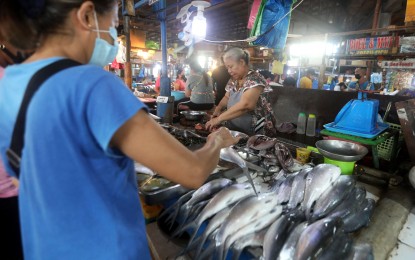
(File photo)
MANILA – The recorded inflation for fish and other seafood commodities has decreased from 9.2 percent in July to 7.2 percent in August 2022 based on the recent data released by the Philippine Statistics Authority.
The same report has indicated an ease in national food inflation to 6.5 percent in August from the previous month’s 7.1 percent. Inflation in the bottom 30 percent income households has likewise slowed from 6.1 percent in July to 5.7 percent in the following month. In this demographic, the inflation for fish and other seafood commodities has also decreased from 8.4 percent to 5.5 percent during the said months.
Among the factors attributed to its decline is the decrease in the prices of oil, a commodity which the fisheries sector, especially capture fisheries, is generally dependent on. With the prices of oil gradually decreasing, more fishers were able to venture out to the sea to fish.
The Department of Agriculture-Bureau of Fisheries and Aquatic Resources (DA-BFAR) welcomed this positive development and commits to working better and harder to ensure an ample supply of fish in the markets and keep the prices of fish commodities at a stable level in the months to come.
The Bureau is upgrading its programs to sustainably maximize the potential of the country’s fisheries resources, increase production, and ensure a sufficient supply of fish commodities for Filipinos.
“Part of the program which the Bureau is set to implement to boost production without raising production cost is the improvement and expansion of the utilization of Fish Aggregating Devices (FADs) in strategic fishing areas in the country. FADs, a technology that attracts high-value fish species, also provide fishers with a precise fishing area, effectively cutting down production costs including fuel consumption,” the DA-BFAR said in a news release on Monday.
The agency has also already set its sights on further developing the aquaculture subsector by upgrading the National Fish Broodstock Development Program to include high-value marine species such as "siganids", snappers, pompano, groupers, and seabass.
“Through this program, more Filipino fisherfolk will be able to locally source out quality fry or fingerlings at an affordable rate,” it said.
With several more of DA-BFAR’s programs on fish production in place, along with other programs on post-harvest and marketing and resource management, the Bureau projects a favorable trend on fish sufficiency and a stable price of fish commodities towards the end of 2022. (PNA)
